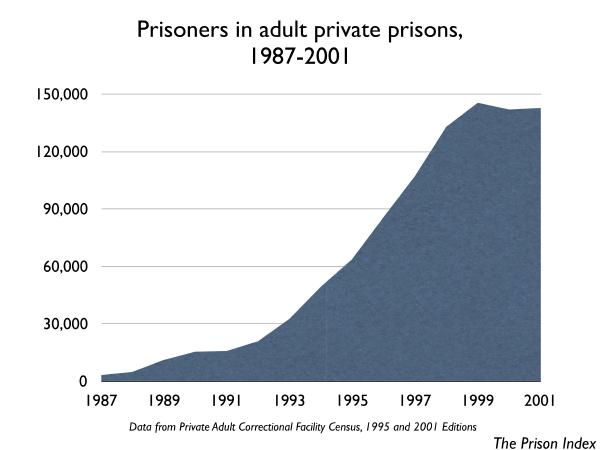Overview: Trends in the Crime Control Industry
Private Prisons

Depending on how you define "private prisons," they aren't brand-new inventions. Some writers trace the roots of private prisons back to slavery or the old Southern chain-gang system. Others only go back to 1984 and the Corrections Corporation of America's contract to run a prison in Tennessee. But today, we can clearly see that private prisons are big business: 7% of the 2 million adult prisoners in the United States are in private facilities. Some facilities are owned and operated by private companies, and some are government facilities run by private contractors. The private prison population has fallen slightly since 1999.
Factors supporting stagnation or reduction in the use of private prisons:
- The rate of incarceration growth has slowed, reducing the demand for new prisons, public or private.
- The private prison companies' recent poor performance in the stock market makes it more difficult to build prisons on "spec" (speculation) in the hopes of winning a government contract.
- The promised cost savings from private prison contracts in the 1990s have failed to materialize.
- Numerous recent prison conditions and escape scandals have tarnished the previously unknown reputation of private prisons.
- The decline of the economy has made the states less willing to sign contracts for expensive private prison services they may not need.
- Some states' laws prohibit the use of private prisons, and strong correctional worker unions in some states are a potent lobby against private prisons.
Factors supporting further growth in private prisons:
- The INS and the Department of Homeland Security are likely to seek cell space for detainees wherever they can find it, including private prisons built on "spec" (speculation).
- Due to the poor economy, private prisons might seem an attractive way to add capacity as the government is not required to build the expensive prison before filling it, renting space from the private prison company instead.
This page is an excerpt from The Prison Index: Taking the Pulse of the Crime Control Industry (April 2003) by Peter Wagner, published by the Western Prison Project and the Prison Policy Initiative.
Events
- April 15-17, 2025:
Sarah Staudt, our Director of Policy and Advocacy, will be attending the MacArthur Safety and Justice Challenge Network Meeting from April 15-17 in Chicago. Drop her a line if you’d like to meet up!
Not near you?
Invite us to your city, college or organization.



